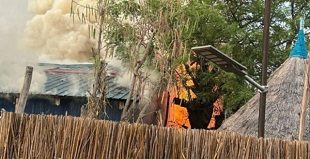
World Bank and Knowledge Consulting Ltd hatch $52bn plan
| THE INDEPENDENT | Ugandan universities and other post-secondary education institutions could get hooked on the high-speed internet while some students and teachers get free laptops under a proposed plan by the World Bank and Knowledge Consulting Ltd.
The ambitious Africa continent-wide five-year project would cost of US$52 billion and see up to 15 million students and 500,000 teachers get laptops starting this year.
The World Bank and Knowledge Consulting Ltd, which proposed the intervention, said the suggested cost would also cover bills for upgrading campus networks, bandwidth cost for upstream connectivity and development support for national research and education networks and their regional counterparts, such as the UbuntuNet Alliance, West and Central African Research and Education Network, or WACREN, and the Arab States Research and Education Network.
The plan is included in ‘Feasibility Study to Connect all African Higher Education Institutions to High-speed Internet’. It is result of four case studies that were undertaken in Burkina Faso, Cote d’Ivoire, Mozambique and Uganda.
According to a team of researchers led by Samia Melhem, a senior digital development specialist at the World Bank, the higher education sector in Africa is behind the global research and education networks in terms of internet connectivity.
“The available bandwidth is generally expensive and limited in capacity and cannot meet modern institutions’ research and education requirements,” the researchers stated in the report quoted by University World News.
Poor campus networks
In their vision of a continent where all higher education institutions achieved global parity in intellectual output and development impact in terms of access and exploitation of broadband connectivity, the researchers noted the main challenges are related to poor campus networks as well as the very limited individual access to computers by students and staff.
The issue is that, although the available primary internet infrastructure has increased in Africa, fibre coverage varies widely among countries, largely influenced by geography, level of competition and investment by public- and private-sector operators.
Whereas some countries have networks that could support their higher education connectivity needs, the presence of an extensive internet infrastructure has not necessarily led to adequate provision of broadband connectivity to universities.
The study highlighted low public- and private-sector investment support for National Research and Education Networks (NRENs). Although most countries have established such institutions, in reality only about 20 countries have NRENs that deliver connectivity to tertiary institutions.
Only about five NRENs in the continent could be considered as mature, a problem that researchers linked to lack of awareness of the role of higher education connectivity, stated the study.
But, contributing to a shortage of funding, researchers argued that most NRENs have failed to retain competent staff, who are attracted by higher pay within the ICT private sector.
 The Independent Uganda: You get the Truth we Pay the Price
The Independent Uganda: You get the Truth we Pay the Price



